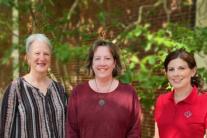Innovative Teaching and Learning Week brings together instructors from across campus to share emerging approaches, p
H5P Communities Creating Connections, Measuring Outcomes
Thu, 03/30/2023 - 12:58pmIn Fall 2022, the Office of Distance Learning received a Louisiana Board of Regents eLearning Innovation Grant to support three Faculty Learning Communities (FLCs) focused on enhancing student learning through H5P course activities.
The resulting communities are led by Penny Powell, Master Instructor of Biology; Kathleen Espinoza, Master Instructor of Geography; and Marissa Lajaunie, Senior Instructor of Health Sciences.
Community members learned how to design interactive content with H5P throughout the Fall and each created at least three H5P activities from three different categories to use in an online or hybrid course this Spring. Their courses are part of a controlled study to measure the impact of H5P interactive content on student learning.
We recently sat down with the three H5P FLC facilitators to learn more about their motivations for leading these communities and their experiences. Find excerpts from our conversation below.
The H5P communities will be presenting their work — along with two other communities — during the FLC Showcase Wednesday, May 3.
To learn more about all five 2022-23 FLCs, visit our website.
Each of you participated in an H5P Faculty Learning Community last year. Why did you choose to come back and lead this project?
Marissa Lajaunie: I felt that after going through last year’s community I had a chance to participate and learn a little bit more about it and learn more about the tools I hadn’t used. So, I felt it was a great steppingstone to have been part of a community before. I felt like I had a better understanding and more knowledge about H5P to move forward and lead my own group.
Kathleen Schott Espinoza: I felt like I still had some learning to do with H5P, but I felt like I had enough experience to at least talk about it and share what I had learned from last year’s FLC with another group of faculty. So, part of it was just continuing my learning journey with H5P and then the other part was to learn how this technology could be transferred to other disciplines.
Penny Powell: The grant was a big reason to continue. Last year's community was a lot of fun, so it was an easy “yes,” and I just enjoyed being a part of a FLC. I enjoyed meeting people from outside of my little world.
Describe what your H5P Community achieved this year.
Marissa Lajaunie: I think a lot of our members learned a lot more about H5P and different types of content, and how to be able to apply the different applications to the content in their courses.
Kathleen Schott Espinoza: The members and I have now integrated the H5P activities into our online courses. We do not really have a lot of feedback yet, but I do think that they’ve accomplished the goal so far that has been expected of them.
Penny Powell: Some of our members didn't have a clue what H5P was or even how to get started. They have created the content that they needed for the grant and learned how to do a lot of new things, too. We've gotten to know people outside of our discipline, and that's been a good thing, too.
Why should faculty use H5P In their courses?
Marissa Lajaunie: I feel like the different types of H5P applications allow for varied learning within the course based on the type of learner. I found that the more the students looked at H5P activities or viewed it, the higher they scored on the quiz or the midterm exam.
Kathleen Schott Espinoza: I feel like as teachers in the online classroom, it's important for us to keep up with the latest technology for course design. It is critical and worth it for any Distance Learning faculty to see the different tools available. I have been teaching this course forever as an online course, and I needed to refresh it. I needed to force myself to take a hard look at the design of the course, and, to me, going through a process like this and learning the different H5P tools is a valuable process.
Penny Powell: I think that it just really gives variety to your content, and it gives you different ways to present the same information to different people. And besides that, they are just fun to do, and it’s not hard to create. I think the students benefit from them, and I think the faculty do, too. I have data that shows that students that use these activities do better.
What are the benefits of participating in an FLC?
Marissa Lajaunie: I think the most important thing is being able to connect with other faculty members from other disciplines because we usually don't get that opportunity. It is cool to see how other FLC members were utilizing the H5P activities and how I could possibly utilize it in my own course. And that's not something you would have been able to see if you weren't part of the community. I also like participating in the FLC because we have direct communication with our Distance Learning Liaison who can help us to work through any issues or problems and are super responsive when we have a question. I also think that the facilitator training with Distance Learning was also helpful for us to become effective facilitators and mentors to our FLC members.
Kathleen Schott Espinoza: I want to echo that being able to work with the Distance Learning staff and administration has been really eye opening. Over the past couple of years, they have been very responsive and supportive, very good at creating a community which carries forward to the FLC. I really don't see a lot of my faculty, and so this for me, has been as close to a kind of a collegial environment among faculty as I've gotten. It just makes the learning more meaningful and comprehensive. I really enjoyed the showcase a few weeks ago because I had not seen what my community had done, and it was nice to see it.
Penny Powell: My answer for the benefits for participating in an FLC are new ideas, new friends, and getting a fresh perspective on teaching and how to make our courses better.
What will success look like for your community?
Marissa Lajaunie: Well, I think success for our community was to get everybody to participate and create the three content types and upload them in their courses. I hope the end result will show that H5P, through the data we collect, did actually enhance student engagement, and allow our students to be more successful. And another element of success is that hopefully the faculty members within our FLC will go and spread the word about how awesome H5P Is to other faculty members, and more faculty members start to utilize this application as well.
Kathleen Schott Espinoza: I think success is that we've really taken ownership of the use of H5P technology. I'm looking forward to seeing some of the qualitative and quantitative data on how students engage with it. I think that there will be a measure of success for sure. If the faculty take it further outside of our FLC and integrate it without being prompted to, I think that would be an important measure of success.
Penny Powell: Continuing to meet, presenting at the FLC Showcase at the end of the semester, continuing to develop new H5P activities to use in our courses, and sharing them with other faculty. I feel like we are already successful.


 Quality Matters has launched the QM Higher Education Rubric, Seventh Edition.
Quality Matters has launched the QM Higher Education Rubric, Seventh Edition.